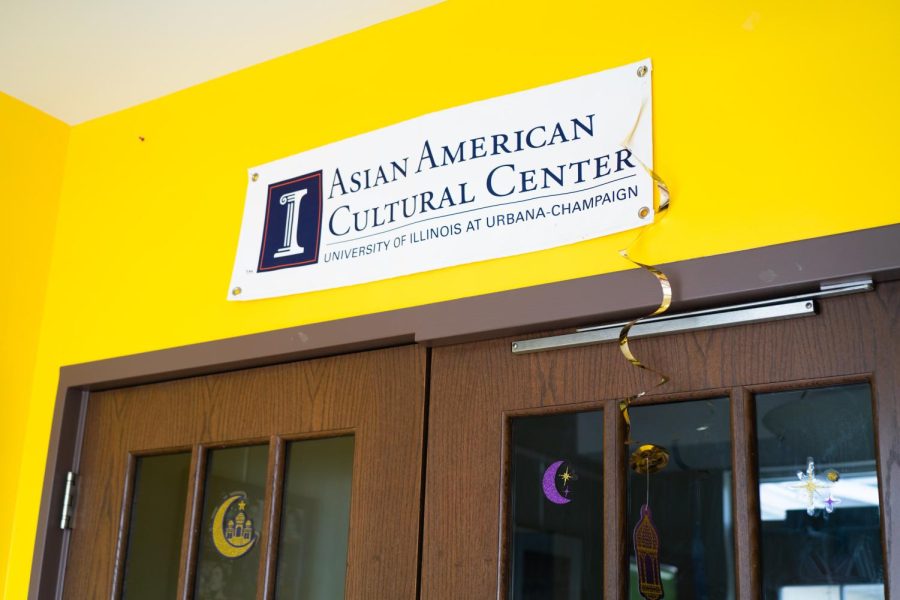Upcoming conference at UI to address anti-Asian racism
A banner for the Asian American Cultural Center is displayed inside the entrance of the center. The department of Asian American Studies and the Unit for Criticism and Interpretive Theory will be hosting an “Asian America Otherwise” conference from May 6-7.
Apr 27, 2022
The Department of Asian American Studies and the Unit for Criticism and Interpretive Theory will be hosting a conference centered on anti-Asian racism next week from May 6–7. The conference will represent the culmination of a year-long effort to bring attention to issues impacting Asian Americans.
According to Susan Koshy, the director for the Unit for Criticism and Interpretive Theory and a conference organizer, the conference’s name will be “Asian America Otherwise” which refers to how society should imagine things differently in terms of criticisms and responses to racial issues.
“It’s really to spark conversation and discussion and questioning,” Koshy said. “It will also create a space for people to come and share ideas.”
Koshy said the conference will be an opportunity to learn from the racial violence that has occurred since the start of the pandemic such as the murder of George Floyd, the disproportionate impact of COVID-19 on communities of color and the Atlanta Spa Shootings.
“It’s not just that people were reacting and mobilizing, but also what we are seeing is a sort of ‘explosion’ type of thinking — creative work, a public statement and various other kinds of expressions — by Asian Americans who felt there’s a real need to respond in new ways,” Koshy said.
Get The Daily Illini in your inbox!
Another goal of the conference is to give Asian Americans in the campus community a space to share personal stories to shape education.
“These conversations and knowledge about anti-Asian racism is primarily something that Asian Americans have and often share with each other,” Koshy said. “However, that conversation and knowledge have been sequestered, compartmentalized and kept outside of broader conversations about racism.”
Koshy also said addressing that problem will require recognition of how such complex racial issues cannot be solved from just one perspective. Instead, it will require an intersectional approach with other minority groups, gender and class.
Using intersectionality, the conference organizers have picked scholars affiliated with institutions all over the country to speak. One speaker will be Ronak Kapadia, an associate professor of gender and women’s studies at the University of Illinois Chicago. Kapadia will discuss how queer and transgender people of color have contributed to frameworks regarding healing and justice.
Intersectionality has been one of Kapadia’s interests as a scholar, and he said he is always thinking about overlapping systems of power that shape lives.
“That’s always been the question: Who are folks who are most impacted and the most harmed?” Kapadia said. “How can we learn from the genius, the wisdom, the creative, artistic and activist practices of people who are marginalized?”
According to Junaid Rana, the head of the Department of Asian American Studies, the conference will be a culmination, not an endpoint, of questions that organizers have been asking in their year-long speaker series, “In Plain Sight”.
“In Plain Sight” has aimed to combat the lack of awareness about anti-Asian racism and also proposed new ways to address current problems.
Speakers included author Cathy Park Hong and author Erin Khuê Ninh, whose speeches have been important in giving context to issues impacting Asian Americans today, according to Rana.
“There’s a way these issues just kind of come and go, and we don’t have enough time to really process the range of issues that we’re facing,” Rana said. “How can we think about that, not only as something just now or contemporary but what’s the history of this?”
According to a press release, the speaker series was funded by the Chancellor’s Call to Action to Address Systemic Racism and Social Injustice Research Program, a $2m annual commitment “to respond to the critical need for universities across our nation to prioritize research focused on systemic racial inequities and injustices.”
Organizers for the upcoming conference said they’re most excited to explore new ideas and hear what people have to say.
“The energy of a conference is about the newness of ideas, how the ideas can spark conversations and how they can go a particular way,” Rana said. “I, as a scholar, thrive off of that, and that kind of energy is what I live for.”
Koshy said there is a lot of strength in the diversity of Asian Americans, which can become a “creative energy” to drive change.
“There’s no fixed way to think about what it means to be Asian American,” she said. “At the core of the identity is the struggle for justice, not just for Asian Americans, but I think for everyone.”






